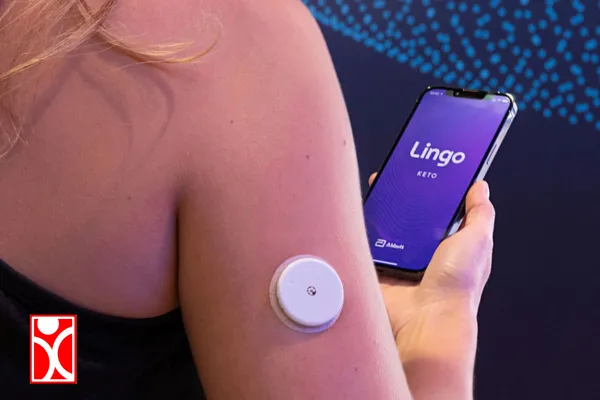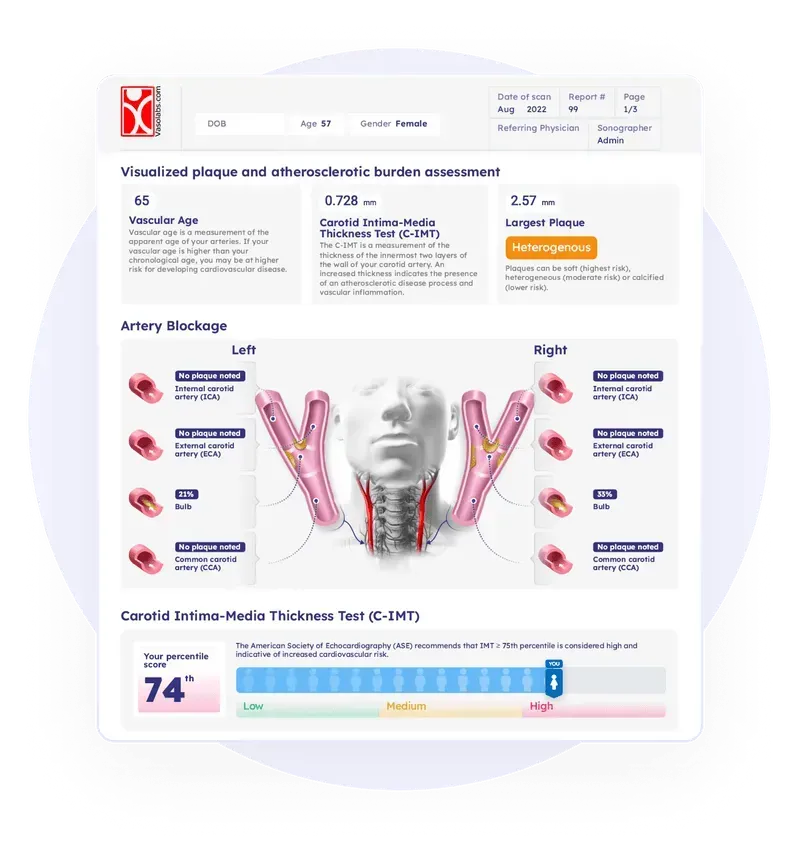801-797-2297
1414 South 600 West, Bountiful, UT 84010
Mon-Friday, 8am-5pm
801-797-2297 | Mon-Friday, 8am-5pm
Welcome to Our Blog: Vasolabs News and Education

The Silent Signal: How Glucose Monitoring Can Prevent Heart Attacks
The Silent Signal: How Glucose Monitoring Can Prevent Heart Attacks
Heart attacks rarely strike out of nowhere. Long before chest pain or shortness of breath ever appear, the body whispers early warnings. One of the most powerful of those whispers comes from your blood sugar.
Continuous glucose monitoring (CGM) isn’t just for people with diabetes. It’s a window into how your everyday choices, the way you eat, sleep, and move, are shaping your cardiovascular future. And when it comes to preventing heart disease, timing is everything.
Why Glucose Matters for Your Heart
Unstable blood sugar quietly fuels a perfect storm inside your arteries:
Inflammation begins to build.
Insulin resistance takes hold.
Plaque formation speeds up.
Tiny, daily glucose spikes and dips harden arterial walls over time, increasing the risk of heart attacks and strokes. What’s striking is that this damage can happen even when your annual lab results look “normal.”
The Power of Real-Time Monitoring
A lab test gives you a snapshot. A CGM gives you the movie.
By tracking your glucose patterns minute by minute, you can actually see how your body responds to:
That morning pastry or protein-rich breakfast
Your stress-packed meetings
A night of poor sleep
A post-lunch walk compared to a sedentary afternoon
This is prevention in high definition, showing you how lifestyle truly affects your arteries in real time.

How Glucose Monitoring Fits Into a Heart Attack Prevention Program
A strong prevention program takes a 360-degree view of your cardiovascular health. CGM fits perfectly into this picture:
PillarRole in PreventionGlucose ConnectionArterial Imaging (CIMT)Detect early plaque before symptoms ariseElevated glucose accelerates plaque, controlling it slows progressionLifestyle OptimizationDiet, sleep, movement, stressReal-time feedback shows what’s working for your bodyTargeted SupplementsSupport vascular function, reduce inflammationHelps personalize your regimen to address underlying metabolic stressTelemedicine & GuidanceProfessional support to sustain habitsGlucose trends give experts better data for prevention strategy
Paired with imaging tools and precision lifestyle interventions, CGM becomes more than a monitor, it becomes your prevention compass.
Sourdough vs Regular Bread: A Surprising Ally in Glucose Control
Bread is one of the most common culprits for glucose spikes. But not all breads behave the same way, and sourdough stands apart.
Why Sourdough Often Spikes Less
Sourdough’s long fermentation creates organic acids, lactic and acetic, that slow gastric emptying and make starch less rapidly digestible. In multiple human studies, sourdough breads, especially whole-grain versions, lead to lower glucose and insulin responses compared to conventional yeast bread.
CGM insight: Many people see a gentler rise in blood sugar after eating true sourdough. It’s one of those small, practical swaps that can make a measurable difference on your graph.
Fermentation Advantages Beyond Glucose
Sourdough fermentation does more than just lower spikes:
Better mineral absorption. It reduces phytic acid, making minerals like magnesium and zinc more bioavailable. Both are critical for vascular health.
More resistant starch. Fermentation can slightly increase the amount of resistant starch, further blunting glucose spikes.
Easier digestion. Long fermentation lowers FODMAP content, making it easier for many people to tolerate.
When you smooth out those glucose curves, you reduce inflammation and endothelial stress, both key drivers of atherosclerosis.
A Note on Labels
Not all breads labeled “sourdough” are truly fermented. Some are just yeast bread with vinegar for flavor. Look for:
Short ingredient lists
Natural starter cultures
Long fermentation times
Whole-grain options when possible
These factors directly affect how your body responds.
The Gluten Caveat
Sourdough fermentation breaks down some gluten, but it’s not safe for people with celiac disease unless it’s certified gluten-free. For everyone else, it can be easier on the gut and metabolic system than conventional bread.
How to Test Sourdough with Your CGM
If you’re curious how your body reacts, run your own personal experiment:
Day 1: Eat your usual bread with your typical breakfast.
Day 2: Swap it for authentic sourdough, same carb amount.
Day 3: Pair sourdough with protein and healthy fats.
Then compare your peak glucose, curve shape, and time to return to baseline. Many people see a dramatic difference.
The Early Advantage: Why You Shouldn’t Wait
Arterial damage doesn’t happen overnight. It builds quietly, often for years. Pairing glucose monitoring with heart imaging gives you a powerful prevention edge.
Catching risk early means slowing or reversing plaque development.
Personalized food strategies, like the sourdough swap, create lasting metabolic stability.
Smaller spikes today mean stronger arteries tomorrow.
This isn’t about restriction. It’s about strategy.
Where Prevention Gets Real
The future of heart attack prevention is personalized. It’s CGM data revealing how your metabolism responds. It’s lifestyle tweaks that lower inflammation before it turns into disease. And yes, sometimes it’s as simple as swapping your bread.
If you want to build a true heart attack prevention plan, consider pairing glucose monitoring with arterial scanning and expert guidance. Early detection plus smart daily choices is where prevention turns into power.
List of CGM we recommend:
👉 Learn more or book your heart scan today at www.vasolabs.com
Why should you get this C-IMT scan?
Informed patients make better decisions.

Early Detection of Heart Disease Risk
A C-IMT scan can act as an early warning system by identifying increased thickness in the artery walls long before any symptoms of heart disease or stroke become evident.

Personalized Treatment Plan
The results of a C-IMT scan can help your doctor tailor a treatment plan to reduce your risk of heart attack or stroke, which is the leading cause of death and disability in the world.

Non-Invasive and Safe
Unlike some other tests, the C-IMT scan is non-invasive and uses ultrasound, not radiation. It's safe and doesn't require any special preparation.

Family History
If you have a family history of early heart disease or stroke, the scan can provide valuable information about your own risk, helping you and your doctor to take preventive measures.

Peace of Mind
If you are anxious about your cardiovascular health, a vasometric scan can provide reassurance if your results are within a normal range.
Vasolabs Is A Premier Provider Of Safe, Convenient Heart Disease Screenings.
Vasolabs Is A Premier Provider Of Safe, Convenient Heart Disease Screenings.
Uses the newest ultrasound technology
Determines whether or not you have heart disease
Pain-free. Requires no wires, treadmills, or needles.
Takes only 15 minutes
Get your Easy-to-Understand Report within 24 hours
Optional Discussion with your Clinician
Schedule a test to see if you’re at risk of heart disease!
Identify Your Risks of Getting Cardiovascular Disease With a Simple C-IMT Scan!
Know if You Are at Risk for Heart Attacks, Strokes, and other Cardiovascular Diseases:
$499 $249
What's Included in your Report:
See your Vascular Age!
Soft or Calcified Plaque is visualized, you’ll see it all.
Track Your inflammation, Know your Artery Blockage.
Informed patients make better decisions.
Loved ones depend on you.
Do I Need a Heart Screening?
Here is a checklist of factors that put you at elevated risk for heart attack, stroke, and other forms of cardiovascular disease:
Over 40 years of age
Family history of heart disease/stroke
Overweight
Increased cholesterol level
High-fat diet
Tobacco user
High blood pressure
Diabetic
Metabolic syndrome
Erectile dysfunction
Psoriasis

Peace of Mind is Priceless

Looking back, it's chilling to realize how close I came to the edge. I opted for a test at Vasolabs on a whim, without any particular symptoms. Boy, am I glad I did! Turns out, my arteries were nearly clogged up - something regular doctors wouldn't have caught unless there were signs of a problem. By the time I got a couple of second opinions and returned to my regular doctor, my arteries were 95% blocked. If I hadn't taken the test when I did, I could have had a stroke. Trust me when I say this, going to Vasolabs was one of the best decisions I've ever made.
- George B

I was really worried about getting a heart attack because its already happened in our family. So taking this test gave me the peace of mind I was looking for. And it was so cool to see the age of my artery was younger than I was!!
- Barbara L.

I went to Vasolabs for their C-IMT testing, thinking it'd be a complicated deal, but nope! It was as easy as getting a photo taken. And guess what? They found an issue that could've been a silent threat. Thanks to them catching it early, my doctor and I are on top of it now. Honestly, I feel like I dodged a bullet. Big thumbs up for Vasolabs!
- Walter S.

I saw an ad on Facebook and I got the C-IMT Test for myself and my husband, it was such an easy process. And a great gift idea for family. It was really fun to look at the results and good to know I need to work on my health.
- Jessica F.
Frequently Asked Question
What is a C-IMT scan?
A C-IMT Scan is a non-invasive procedure that uses ultrasound technology to measure the thickness of your carotid arteries' walls. These arteries, located on each side of your neck, supply blood to your brain. Over time, plaque can build up in these arteries, causing them to thicken. This is often an early sign of atherosclerosis, a disease that can lead to serious conditions such as heart attacks and strokes.
Where do I go to get this scan?
For your quick, 15-minute appointment, simply head over to our facility located at 1414 South 600 West, Bountiful, UT 84010.
Who takes my test?
Dean Ence, an expert sonographer, will be handling your fast, no-pain test to figure out the 'age' of your arteries. This test checks how thick your artery walls are - thicker walls can mean inflammation. It's all simplified for you to understand easily. We also spot and show plaque, whether soft or hard, in your arteries. You get detailed pictures from the ultrasound for your records. Taking care of your health is our main goal!
How long does the C-IMT Scan and Report take?
The duration of the C-IMT scan can vary depending on various factors, like the complexity of the patient's condition. Typically, a Vasometric scan takes around 15 minutes to complete. The report is done and delivered within 24 hours to you.
Will my insurance cover this C-IMT Scan?
No. Hospitals charge $800, but our cost is $249.

